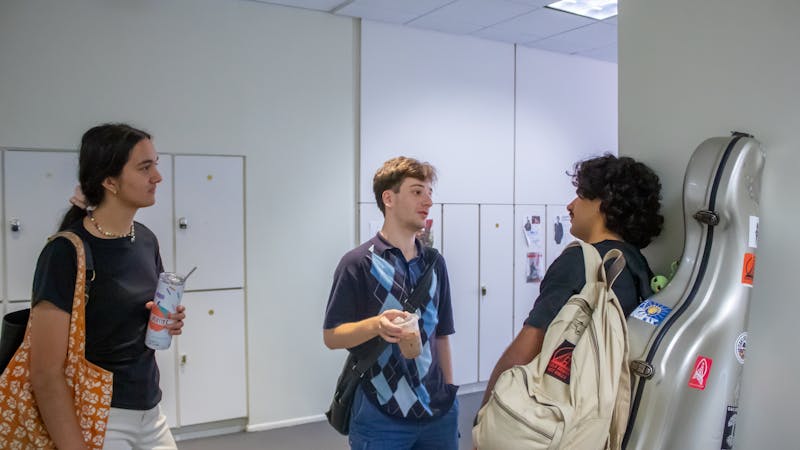Guggenheim Fellow Lacy Johnson talks climate violence and why she writes

Intricate plankton, jellyfish and corals fill the drawings of Ernst Haeckel, a 19th-century German biologist, philosopher and naturalist. The prints caught the eye of Rice’s latest Guggenheim Fellow Lacy Johnson, who took a deeper look into Haeckel’s life. In her research, she unearthed the biologist’s prominent work in scientific racism, work which has led some historians to conclude that Haeckel informed the eventual rise of Nazi ideology in Germany and fascism in Italy.
“I had such a hard time holding those two things in my head at the same time,” Johnson, an assistant professor of English, recalled. “How can a person offer such a generosity of vision toward these microscopic sea creatures and not be capable of extending the same generosity of being toward their fellow humans?”
Informed by this dissonance, Johnson’s latest work is an inquiry into the current moment and the state of climate change, uncovering and connecting violence against the environment to the ways in which humans harm each other. On April 8, Johnson won a prestigious Guggenheim Fellowship to pursue the project.
The Guggenheim is a premier national competition — Johnson is one of the 175 scholars, writers, artists and scientists awarded a fellowship from a pool of over 3,000 applicants. The fellowship grants scholars funding to dive into a project of their choosing. Drawing on her fascination with Haeckel, Johnson’s upcoming book-length essay seeks to “examine how prevailing ideas about ‘nature’ contain within them implicit permission to commit violence against the environment and one another,” according to the fellowship website.
Johnson was thrilled to be recognized, but it has been difficult for her to celebrate in light of the pandemic.
"I feel incredibly grateful and honored to have my work acknowledged in this way,” Johnson said. “But at the same time, I haven't celebrated because it seems, you know, not appropriate at this time.”

For Johnson, the road to becoming a writer and an English professor — let alone a Guggenheim Fellow — has been “circuitous.” Johnson grew up in a farm town in rural Missouri. She was the first person in her entire family to get a doctorate, and the first on her mother’s side to go to college at all.
“I think my hometown has the same population, roughly, as Bellaire High School — less than 5,000 people,” Johnson said. “I didn't realize that being a professor of creative writing was a thing that you could do until I was already an undergraduate.”
That realization happened when Johnson took her first creative writing class in college — a poetry workshop — as a prerequisite for journalism graduate school, which she was considering attending.
“My mind was completely blown,” Johnson said. “[I thought to myself,] I'm going to be a professor of creative writing. That's the thing I'm going to do.”
As of spring 2020, Johnson has published multiple books, essays and articles. Her second memoir, “The Other Side” (2014), was named a finalist for the National Book Critics Circle Award in Autobiography, and her most recent book, “The Reckonings” (2018) was named a finalist for the National Book Critics Circle Award in Criticism.
Johnson’s work addresses violence and justice, specifically violence against women, but recently she has broadened her scope to explore similarities between racial violence, violence against the environment and forms of institutionalized violence, all connected “like spokes on a wheel.”
“[I’m guided by] the desire to put into language that which resists language and to reveal that which is obscured; to give voice to, or, to put words to experiences that many people share but few people can voice,” Johnson said.
During her time at Rice, Johnson has taught “Introduction to Creative Nonfiction,” “Nature Writing” and a preparation course for senior theses. This semester, she added a new course she developed called “Documenting Disaster.” In the course, Johnson teaches the technical aspects of longform journalism: form, technique and methods. The other part of the course, Johnson said, is about the ethics of representing people’s suffering for an audience.
“How can you write with your subjects rather than about them? How can you partner with organizations and communities so that the work that you do is effective rather than just entertainment, that it has the potential to turn the knob towards justice a little bit?” Johnson said these are some questions that her course considers.
Amid the COVID-19 pandemic, the questions of Johnson’s course come at a seemingly apt time.
“Recently we've been talking a lot about hope and despair and whether writing does any good, and those are questions that I think about in my own work too,” Johnson said.“Writing about these difficult subject matters is difficult for me and it's sometimes difficult to read about them and certainly difficult for people who are experiencing different forms of institutionalized violence. So does writing about it make any difference?”
Though Johnson stated that it’s still an “open question,” she believes that writing has the power to turn the knob towards justice.
“I believe that it does. I know I have been changed by writing that I have read. I am a different person because of the work that has informed me and the intellectual lineage in which I take part,” Johnson said. “I believe in that and that's part of the reason, I think, to write.”
With the Guggenheim Fellowship, Johnson hopes to turn the knob a little further.
More from The Rice Thresher

Over 1,000 students petition against new meal plan
When Konstantin Savvon opened the Housing and Dining email announcing the new unlimited meal plan, he was instantly concerned about the impact on off-campus students like himself.

Rice shuttle bus drivers reflect on changes and connections behind the wheel
Martine Stewart has spent the past year behind the wheel of Rice’s greater loop shuttle, circling the inner campus from the early morning to late afternoon. She said she has come to recognize many of her regular riders – not just their faces, but the exact spots where they wait to be picked up.

Music majors at Rice’s Shepherd School tackle busy schedules, future goals
Cirdan Vonnahme began playing the cello at 4 years old. After winning his first competition at 11 and debuting with an orchestra, he realized he wouldn’t mind playing the cello for life.

Please note All comments are eligible for publication by The Rice Thresher.